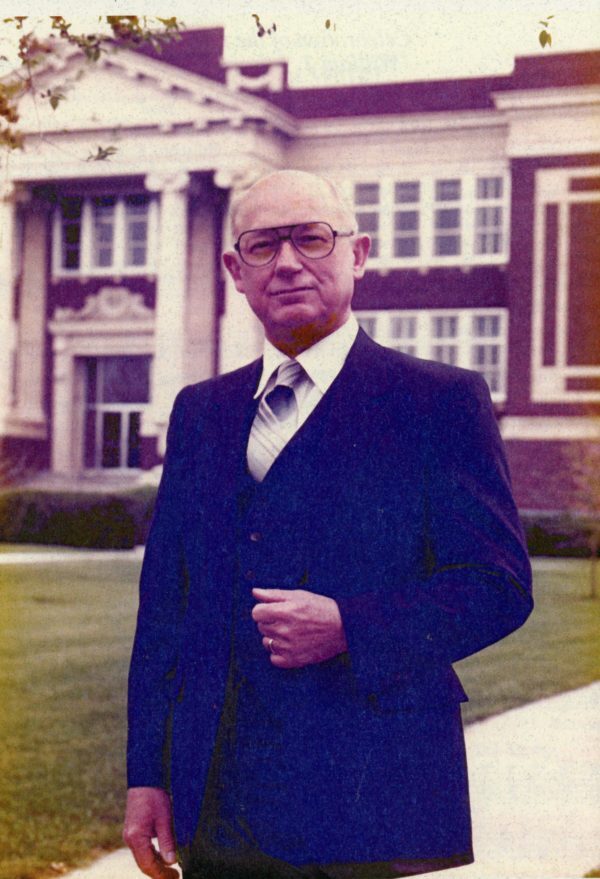Dr. Will Johnson | Tabor College / https://pipeline.locallabs.com/media/43a9f582.jpg
Dr. Will Johnson | Tabor College / https://pipeline.locallabs.com/media/43a9f582.jpg
“To the work! To the work! We are servants of God, let us follow the path that our Master has trod…”
The music of an early 1870s hymn “To the Work!” was a constant in Dr. Will Johnson’s mind. So much so, his son, Dr. Carey Johnson (g’73), said he regularly heard his father hum the melody.
It’s the perfect illustration of a Tabor College pioneer, knowing the second he arrived on campus, he was answering God’s call for the work put before him.
Seventy-five years later, the imprint of his work has not been forgotten.
Johnson and his family moved twice before settling in Shafter, Calif. when he was 7 years old. The family farmed in the Central Valley but labored as they lived in at least eight locations over the next 20 years. While difficult, his childhood of living on the farm brought a foundation of a strong work ethic, curiosity, and interest in agriculture.
Those influences took him to Bakersfield Junior College for two years, leading to his degree in dairy science at the University of California Davis in 1937.
While working as a record keeper on a large dairy farm, Johnson went to hear Tabor President A.E. Janzen (1935-42) speak in Shafter. The fire was ignited to see what this Kansas college was about. Johnson chose to attend Tabor, studying bible courses and preparing to teach during the 1939-40 academic year.
After returning to California, Johnson received a phone call from Zoar Academy in Inman, Kan., in December 1942. He spent 18 months at the academy and then later taught at Inman High School. He met and later married his wife, Georgina Kornelsen, an Inman resident and longtime Tabor librarian (1961-92).
It was only the beginning of his stay in Kansas.
Johnson was pursuing graduate studies at Kansas State University in 1947 when he received word from Tabor President P.E. Schellenberg (1942-51) about his aspirations for chemistry. It would be a brand-new program and the fourth Tabor president wanted Johnson to take the lead.
Carey reiterated how big of a step this was for his father, but from his time spent hearing about Tabor in Shafter to his one year of classes, a calling was put in Johnson’s heart. After taking the job, that call was quickly confirmed.
“It was the opportunity to teach at Tabor College,” Carey said of what sold his father. “It wasn’t just to teach at a Christian college. He never thought about moving on to somewhere else. He was incredibly loyal to Tabor.”
“Tabor College gave me the best opportunities to help students prepare for a life of serving God and mankind as a physician or other medical field, as an educator, as a practicing laboratory or basic research chemist.”
Dr. William Johnson, courtesy of the Center for Mennonite Brethren Studies (September 2004)
Thirty-five years after starting the program, including 33 years as a chemistry professor and two as a business manager, Johnson saw nearly 100 students graduate with chemistry degrees. Over half of them went on to earn a Ph.D. or other medical degree.
Johnson didn’t want the credit; he was passionate about seeing God glorified through the work of his students.
As his tenure continued, he was particularly gratified with the reputation that his department built at the University of Kansas School of Medicine.
“He was very proud of the reputation of Tabor at KU,” Carey said. “A recommendation from Tabor, and him, meant a lot to those professors. His students got in more often than not.”
Johnson, known for his expectations and goals of academic excellence, was also celebrated for his innovation and ability to adapt to an ever-changing field. Carey said his father’s love for research influenced him, his sister and so many of his students.
Later in his career, it was a sabbatical year that took him to Zambia in 1970. He was also diligent in taking part in summer courses that were funded by the National Science Foundation. It was stops at the University of Southern California, Appleton, Wis., and the Rensselaer Polytechnic Institute in Troy, N.Y.
While completing his graduate work at Iowa State University in the 1970s, Carey also saw his father come to Ames to take a course in nutrition.
“Even as he approached his retirement, he wanted to keep up on things,” Carey said. “He’d bring everything he learned back into his teaching.”
Retiring in 1982, the family chose to remain in Hillsboro. Johnson was a very active supporter of Tabor, including academics, athletics, and a scholarship that still stands today in his name.
He watched with pride in his eye as the science department, which once sat on the third floor of the H.W. Lohrenz Administration Building, moved from the bottom floor to its own space, the Solomon L. Loewen Natural Science Center, in 1997. His name is recognized in the atrium of the facility.
No matter if it was his first graduating class in 1951 or his final seven students in 1982, his hope and prayer never wavered.
“Let us hope, and trust, let us watch, and pray, and labor till the Master comes…”
** This story includes quotes from a writing, “At Tabor 35 Years,” that Dr. Will Johnson gave to faculty and the Center for Mennonite Brethren Studies in September 2004. Photos and historical information were provided by Dr. Carey Johnson and the Center for Mennonite Brethren Studies.
Original source can be found here.


 Alerts Sign-up
Alerts Sign-up